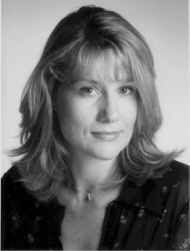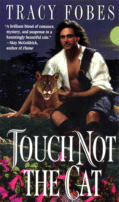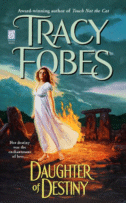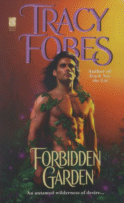A Conversation With Tracy Fobes
by Claire E. White
Award-winning paranormal romance author Tracy Fobes

|
Her first novel, Touch Not the Cat, is a story of dark enchantment in the Scottish Highlands of 1427. Published in 1998, it was an immediate hit with reviewers and readers alike. Touch Not the Cat won the Waldenbooks Award for Bestselling Debut Author in Romance. Tracy's next book was Heart of the Dove, a story of love, witches and magic set in England in the 1850s. Heart of the Dove was a finalist for the RITA award for Best Paranormal Romance. Tracy was also the recipient of the 1999 PRISM Award for Best Paranormal Romance. Her next novel, Forbidden Garden, follows the adventures of Anne Sherwood, a botanical illustrator with a gift for talking to plants. Anne's work takes her to a mysterious estate in Ireland to sketch a famous scientist's unique plant. Instead, Anne finds a terrifying estate where the plants seem positively evil. But she also finds romance with Michael McEvoy, an enigmatic figure who prefers the loneliness of the wild to society and its entrapments.
Her new novel is Daughter of Destiny, which Romantic Times has already chosen as one of its Top Picks. Set in Wales in Regency times, it's a story of a woman, Georgiana, who possesses the ability to create illusions with her mind. Georgiana remains unaware of the power she commands, and is trapped in a marriage of convenience to Brock, Lord Darleigh. She is also a marked woman, the target of the Arch Druid who will see her dead before she fulfills her destiny. Brock, her husband, has watched Georgiana bloom into a seductive and flirtatious beauty. Now, he's grown desperate to have her at his side, and knows he must court her to win her back. But first Brock must erase the mistakes of the past and protect Georgiana from a treacherous destiny that only their love can overcome.
Tracy's books are an intriguing and unique blend of romance, passion and the supernatural, and appeal to lovers of romance, suspense and the paranormal. When she's not writing, you might find her spending time with her two daughters, reading or tending to her orchid garden. Tracy spoke with us about her new book, Daughter of Destiny, how she made the transition from systems analyst to romance author, and how she writes those steamy love scenes.
What did you like to read as a child?
I remember becoming hooked on reading in the fourth grade. Alfred Hitchcock's Three Investigators series, modeled along the lines of the Hardy Boys mysteries but with a paranormal slant, kept me up well past my usual bedtime. By the sixth grade I was reading just about everything. In fact, my sixth grade teacher saw me with The Exorcist and asked me if my parents knew I was reading it. They didn't!
Even in those days, I balanced out my horror reading with romance. A Barbara Cartland novel was the first romance I read, and immediately, the excitement between the hero and heroine -- just as potent as the excitement found in the horror genre -- caught at me. I went on to read classics from Kathleen Woodiwiss and Laurie McBain, and I knew that I had found another genre which really appealed to me.
When did you know that you wanted to be a writer?
Very early on, in elementary school. I didn't think I'd make a career out of writing, but I knew I'd always be scribbling in a journal, no matter what I ended up doing as an adult.
What authors have influenced you in your writing?
The classic romance authors have had a big impact on me. I find myself trying to emulate Kathleen Woodiwiss's strong heroes, Jennifer Wilde's attention to sensual detail, and Claire D'Arcy's sparkling dialogue. Also, Dean Koontz and Stephen King, two absolute masters of not only the horror genre but of storytelling in the finest sense, have given me the courage to add edgy and sometimes frightening elements to my stories.
What led up to the publication of your first book, Touch Not the Cat?

|
Touch Not the Cat was a hit with reviewers, fans and also picked up quite a few awards in the paranormal romance category. Were you surprised at the book's immediate and huge success?
Yes, I was. I had heard repeatedly that the paranormal market was very small. People warned me that my book would probably go unnoticed among the more popular historical and contemporary romance releases. When my editor at Pocket Books called me and said I had won the Waldenbooks Award for Bestselling Debut Author in Romance, I nearly fell off my chair.
In Forbidden Garden, you explored the worlds of plants, botanical illustration, and genetic engineering -- Charles Darwin even makes a very entertaining cameo appearance. How did this book come about?
From Hell It Came... I saw this movie when I was very young, with a girlfriend, on a Sunday afternoon television showing of Creature Feature. The movie was about a tree that came to life and ate people. For years after watching this movie I heard a tree monster in the hallway outside of my bedroom. It became my own personal boogeyman. Now, of course, I see it as very kitchy, B-movie stuff, but considering how it had haunted me I decided that I had to write a book with a very nasty piece of greenery in it.
Let's talk about your new novel, Daughter of Destiny. What was your inspiration for this story?

|
At the same time, I was interested in writing a book involving virtual reality, but I couldn't figure out a believable way to utilize such a concept in a historical setting, which is my forte. Having read about druids, I knew they supposedly had the power to create illusions, which sounded a lot like virtual reality to me. So I decided to give my heroine the ability to create her own reality via druid magic.
The heroine of the story is Georgiana, a Celtic druid, who has unusual powers which she doesn't find out about until she is an adult. Are Celtic history and magic special interests of yours? How did you become interested in these subjects?
| "I think the values treasured in a traditional courtship between a man and woman are still fashionable, and I suspect they always will be. On some levels they're primal, like that of survival. On other levels, they allow us to show each other respect and love." |
In the novel, the hero has to be pretty strong to stand up to such a powerful woman. What was the most challenging aspect of creating the character of Lord Darleigh?
It's tough to create a hero who is able to accept the heroine's strength and not be threatened by it. Social context determines attitudes and, unfortunately, in our society men must be the strong ones or they are not men at all. The challenging aspect of creating Lord Darleigh was balancing the scenes so she could be strong without him appearing weak as a result.
The relationship between Georgiana and Brock is a complex and intriguing one. What went into your decision to enter their story after they had been married for several years?
I've seen several marriages end in divorce and I've felt at least some of the pain of those families who've lived through it. I wanted to write a book that offered a different ending than that which I've seen too often in life...one that offered a message of hope.
Your books are known for their unique plot twists and strong heroines. Do you have strong feelings about what you do or don't like to see in a heroine in a romance novel? Are there any types of heroines which really turn you off?
I like strong, independent women who are capable of taking care of themselves. I usually won't read a novel if the protagonist is wimpy, regardless of gender. My favorite heroine is a go-getter who seeks her own happiness, and my least favorite heroine is one who allows others to make decisions for her and take care of her. One heroine that stands out for me is the Jane Whitefield character in Thomas Perry's thrillers. Now there is a feisty woman whom I admire wholeheartedly.
Your books are also known for their delightfully spine-chilling details. Why do you think readers are so fascinated by paranormal romances?
The paranormal romance genre (excluding time travel) is fairly new. It offers fresh look at traditional historical and contemporary romances, which many readers find appealing. Also, television series such as The X-Files and Buffy the Vampire Slayer, which combine romance and the paranormal, have proven very popular and have made mainstreamed the paranormal to some extent, giving the written genre a boost.
Do you think our modern society is lacking in romance? (Certainly, we're not lacking for openness about sex, but that's something different.)
I think the values treasured in a traditional courtship between a man and woman are still fashionable, and I suspect they always will be. On some levels they're primal, like that of survival. On other levels, they allow us to show each other respect and love.
How do you approach writing love scenes in your books? What do you think makes a really great love scene?
A love scene is great only when sufficient sexual tension has built between the hero and heroine. I try to use the five senses (or six!) extensively between the protagonists before sending them to bed. The touch of his hand, the scent of her hair, and the emotions these types of things evoke add to longing growing between them. In my stories, that yearning must get to an explosive point before I finally allow them release.
Was it difficult making the transition from systems analyst to full-time writer?
Not at all. While working as a systems analyst, I was frustrated by my inability to write. I wanted to tell stories, but never seemed to have the time. After spending a day in front of a computer at work, I couldn't bear the thought of coming home and spending the night in front of a computer writing. Once I quit my job, however, I indulged myself by writing all day. The frustration went away and I never found myself regretting the decision to become a full-time writer.
I'd like to talk about the creative process itself. Would you describe your surrounding for us? What is a typical writing day for you like?
| "Write the book that's in your heart. It doesn't matter if your story doesn't fit any existing lines. Editors and readers are looking for passion, and if a story is told with gusto, it will sell, even if it's set on Mars in prehistoric times." |
How do you approach a new novel? Do you use outlines and/or character bios?
I use both: outlines and character biographies. I find I need both to write a well-rounded story.
What is your advice to the aspiring romance novelist?
Write the book that's in your heart. It doesn't matter if your story doesn't fit any existing lines. Editors and readers are looking for passion, and if a story is told with gusto, it will sell, even if it's set on Mars in prehistoric times.
How do you think the Internet and the rise of epublishing will affect the romance market? Will we be reading your books on electronic reading devices in 10 years, instead of on paper?
I don't see paper books going away, but I also imagine the conveniences of a hand-held electronic book will eventually become more popular. Electronic books will provide us with another choice for reading a story, joining the ranks with audio cassettes and paper books.
Can you give us a sneak peek at your next book project?

|
What are your thoughts about writing in another genre, such as fantasy or SF?
I don't have any plans to tackle another genre. I enjoy focusing on relationships first, and delving into paranormal happenings second, so the paranormal romance genre is perfect for me.

|
I usually spend my free time with my family, or reading, or gardening. I grow orchids and have a pretty respectable vegetable garden...though none of my plants move on their own, or have developed a taste for human flesh!
Return to the September 2000 issue of The IWJ.
More from Writers Write
